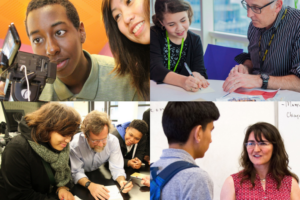Opening a window on the world
At KIPP NYC College Prep, a group of high school seniors did not know that Osama bin Laden had been killed more than a year earlier until they learned it in their NLP unit. By the time their unit was done, they were following world events as avid readers of The New York Times.
In Chicago, as a result of their experience with NLP, middle school students in the Marquette Park neighborhood began to read and watch the news for the first time and to discuss the day’s events each evening with their families.
“I have begun to closely monitor where I get my news and the quality of news I take in,” 10th-grade student Hermela Mengesha wrote after completing an NLP unit at Montgomery Blair High School in Silver Spring, Maryland, last October. “I also understand the importance of being socially and politically aware.”
For the past seven years, NLP has been opening a window on the world for students by sparking an interest in the news. In the process, young people, particularly those from underserved communities, are gaining the tools to become lifelong learners through the news media.
“The News Literacy Project allows an opportunity for my students to experience worlds and ideas that are so different from the lives that they lead on their blocks,” said teacher Carol Moran, who has included NLP units in her high school English classes at Chicago Military Academy since 2010. NLP “creates a deeper understanding of the world that they are in than any textbook lesson.”
As an example, she cited a recent class when students were discussing the role of the press as a watchdog during the Iraq war and a student recalled an NLP lesson delivered via Skype by Nancy Youssef, a correspondent with The Daily Beast in Washington. “That a student can connect what we are doing now to what they experienced last year is an extraordinary learning outcome,” Moran said.
Moreover, students who complete NLP units say they are more likely to become civically engaged. They are more inclined to create blog posts, correct a mistake they find online and vote in elections when they are old enough to do so, NLP assessment data show.
“We are changing the behavior of kids,” said Karen Toulon, executive editor for special projects at Bloomberg’s New York City headquarters and a leader of NLP’s partnership with Bloomberg and PS/MS 57 James Weldon Johnson Leadership Academy in East Harlem. “To see them blossom and become engaged is really remarkable.”
Beyond its classroom, after-school and digital programs, NLP is bringing students to news organizations on field trips. Such experiences can shape future aspirations.
During their visit to The New York Times last year, middle school students from De La Salle Academy had the opportunity to sit in on an editorial meeting with the associate managing editor for weekends, Marc Lacey, and the weekend staff. Lacey, an NLP journalist fellow, invited the students to weigh in on which stories and photos to play most prominently on Sunday’s front page.
“The experience made me feel honored to be in the building and to actually be in the meeting for the Sunday newspaper,” said student Jaymi Choi. “The experience made me want to work for The New York Times.”